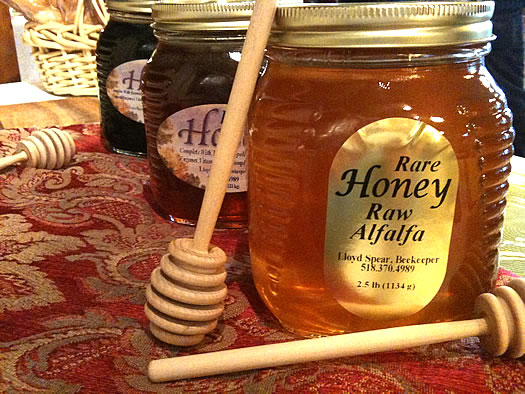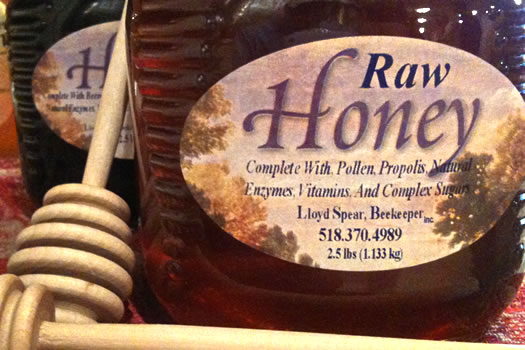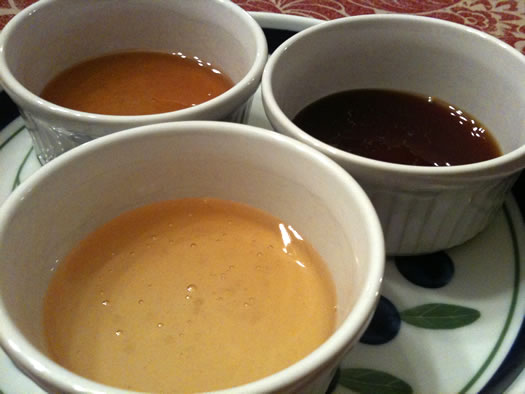Lloyd Spear Honey

Buzzzzz.
Consider me converted.
Upon arriving to the area, my family was struck by the many varieties of local honey available at farm stands and farmers' markets. Part of eating local was enjoying these naturally sweet products.
Except there was a problem: granulation.
Really, it's not a problem. It's more of a nuisance. Because all honey eventually granulates, and it can be easily fixed by placing the jar in a pot of warm water until the crystals dissolve. But who wants to do that?
So we fell off the wagon and found some reasonably tasty supermarket honey. But recently all has not been well in bee-land. There have been all kinds of problems going on from colony collapse disorder to reports of fraudulent and contaminated honey being brought into the United States.
That, in addition to the rising price of supermarket honey and the very vocal fan base of local beekeeper Lloyd Spear led me to his stall at the Schenectady Greenmarket earlier this year. We've been buying Lloyd's honey ever since.
Recently when picking up a donation of honey he was making to the Jewish Food Festival, I had a chance to chat with him and find out what makes his stuff so good.
Lloyd's is a small operation. He has about 300 hives, which he says are mostly in Columbia and southern Rensselaer counties. To put that in context, he explains, "The rule of thumb is you can't support a family on fewer than 1,000 hives. And we have beekeepers in the area who have several thousand hives."
This is a sideline activity to be sure. But it sounds like he takes great care of his bees.
On the subject of colony collapse disorder, Lloyd says, "We haven't really had the problems that the big beekeepers have. Yes, we've had problems. But not to the extent that the big commercial bee keepers have who move their hives. That's one of the characteristics of how we beekeep. We don't move our hives." He does this to reduce stress on the bees, which is one of the suspected contributors to CCD. He also lets them feed on their own honey over the winter, whereas some greedier beekeepers take all the honey and leave the bees with a cheap sugar water substitute in its place. This is a pretty big deal since to make sure the bees make it through our long cold winters, Lloyd needs to leave them 70 to 100 pounds of honey.
Because his operation is smaller, Lloyd can also produce specialty honey that might not make sense for larger beekeepers. One of these is his raw and unfiltered alfalfa honey. It's incredibly light in color and flavor. It's delicately floral and a bit redolent of jasmine blossoms. This would be something to drizzle on a fresh goat cheese or sweeten a lemon pressé.
Lloyd explains: "Alfalfa is a plant that is grown for its protein value and the very high protein that cows need to produce lots of milk." While he says there is no organic honey produced in the United States, his honey was collected from "dairy farms, so they don't spray. They can't spray because it would be in the milk."
One reason why this honey is so special is that because of its high fructose-to-glucose ratio (honey is mostly sugar) it takes two years to granulate. That's a long time for a raw and unfiltered honey. Some will granulate in two weeks.

There are people who like granulated honey. But it's the fight against granulation that leads most producers to filter and heat their honey, sacrificing flavor for shelf life. Lloyd doesn't filter anything. Some of the honeys get strained. But the unfiltered ones like his alfalfa honey are just allowed to settle. Things you don't want -- like wings, legs and stingers -- are suspended in the honey along with things you do -- like pollen, propolis, enzymes and vitamins.
For the most part the bits you don't want rise to the top. But Lloyd assures me that a disembodied stinger is no cause for alarm. This is easy to say for someone who has been stung so much that he is immune to honeybee stings. However, Lloyd swears that a stinger is just a tube, and the painful reaction to being stung comes from the chemicals injected from a living bee.
If you don't care for this kind of natural product and want something a little bit more refined, Lloyd strains some honey through a filter and then heats it up to 140 degrees. But the enzymes that some people prize start to get destroyed between 110 to 115 degrees.
When it comes to Lloyd's honey you have two choices: unfiltered & raw OR strained & heat-treated.

For our daily home use we have been buying the raw and unfiltered wildflower honey for months. It's a bit darker -- in color, smell and flavor. It's a golden brown, and has an earthy aroma with just a hint of barnyard funk. Many of the tasters at the Jewish Food Festival found this nicely balanced honey to match most closely to what they thought honey should taste like. My kids enjoy it mixed in their peanut butter, and I enjoy a drizzle of it over some Greek style yogurt for a healthful dessert.
Not all of Lloyd's honey comes from his own bees. The orange blossom honey comes from a small beekeeper in Florida, and the buckwheat honey comes from a similarly small producer in Washington State.
During the tasting at Congregation Gates of Heaven, the buckwheat honey was the only one that made some people crinkle up their noses. However, others loved it. This is a very dark and strongly flavored honey, that's really complex with an earthy aroma and some hint of damp forest floor. You could use this buckwheat honey as you might use molasses.
My hope had been that one of these three bottlings -- the alfalfa, the wildflower or the buckwheat -- would have been a clear crowd favorite at the honey tasting conducted at the Jewish Food Festival this past weekend. But all of them had their admirers, and all of them have their own special uses. I can't pick just one, although I am a wee bit partial to the alfalfa.
Lloyd's honeys can be found at local area farmers markets and farm stands. He also has a honey house in Schenectady, which handles production (and has no bees on site).
That's important for me. Because while I may have rekindled my love for local honey, I still hate bees.
Daniel B. is the proprietor of the FUSSYlittleBLOG. He's also sitting on an apparently traumatic story involving the beach, his sister, and a mouthful of bees.
Hi there. Comments have been closed for this item. Still have something to say? Contact us.
Comments
Interesting read -- I've seen his honey at pretty much every farm/orchard shop in the area but never bought any. Maybe I'll have to try it, once I use up the bottle I have in the pantry (which I'd swear was also raw honey, bought from a local farm, but not with his name on it -- I'll have to check the label when I get home).
... said KB @ Home-Baked Happiness on Mar 27, 2012 at 12:35 PM | link
I stepped on a bee hive when I was 2 or 3 years old, so I can relate to your feelings about bees. I was afraid of them through much of my childhood. Since I started gardening, however, I have developed a new appreciation for bees and their role in the ecosystem. I enjoyed reading your post.
... said Ellen on Mar 27, 2012 at 12:47 PM | link
Lloyd's honey is great. I recommend the honey comb and a nice sharp cheddar.
... said Aaron on Mar 27, 2012 at 12:53 PM | link
I love Lloyd Spear. Ever since discovering him at the Troy Farmer's Market a number of years ago, my shelf has ALWAYS contained a jar of Lloyd's honey. At first, I worked my way through all of the different kinds and Wildflower has always been my go-to since sampling them. I also love the creamed honey with pecans and just recently tried the honey infused with oranges. Occasionally when I feel I deserve a special treat I buy the comb honey which is fabulous on English Muffins or right out of the box with a spoon. His candles are also a staple at my home. They're great for pet odors - they have a very subtle honey aroma that I adore.
... said Valerae on Mar 27, 2012 at 1:04 PM | link
I've been exclusively buying Mr. Spears' honey since I first discovered it in the coop in Potsdam where I went to college. I eat with it, cook with it, and even mix it with chamomile flowers to make a face wash. It's amazing stuff.
... said ktvorwald on Mar 27, 2012 at 2:50 PM | link
Once I put one teaspoon of his buckwheat honey in my signature honey cranberry cake. It turned out one teaspoon is way too much. The honey flavor was overpowering. Great, great stuff!
... said Lu on Mar 27, 2012 at 5:45 PM | link
I'm a big fan. The raw honey is what we buy - at Honest Weight and the Schenectady Green Market.
... said xina on Mar 27, 2012 at 6:29 PM | link
I seem to be curating a collection of Lloyd Spear's honey because I have a fair amount of it in my pantry. This post inspired me to buy the spun honey with lemon at the Honest Weight tonight. It's delicious and I'm sure it will be lovely in a cup of tea, but it's really crying out for a warm blueberry scone. (His spun honey with cinnamon is also superb on toast, with our without almond or peanut butter.)
... said chrisck on Mar 27, 2012 at 9:09 PM | link
Eh, I'm still a fan of the honey I grew up with (Tweedie's Honey from Delmar), but Lloyd's honey sounds good enough to at least give it a try.
... said Fugue on Mar 28, 2012 at 2:16 AM | link
this might sound crazy, but i feel like my allergies flare up when i eat unfiltered honey. is that possible?
... said colleen on Mar 29, 2012 at 12:42 PM | link
A friend turned me on to this gentleman's products with a gift of the creamed honey, which is ridiculously good. It's like buttah. You wind up just eating it with a spoon!
... said Leigh on Mar 29, 2012 at 7:11 PM | link
I've been buying Loyd's honey for years now...I came across it one year, apple picking with my, then, little ones. Growing up, everytime they got the sniffles...they took Loyd's honey straight with a spoon, instead of Children's Tylenol. As a result, they've never had a flu shot....1 day with raw honey, was always the cure. They especially loved the creamed honeys with cinnamon and cranberries.
Loyd's honey is the best!!
... said Kiley Rivera on Oct 3, 2014 at 11:02 PM | link
where can I purchase Lloyd spear's honey?
... said Carolyn Wellington on Dec 3, 2014 at 2:54 PM | link
Hi Carolyn, long time, no see. You can get the honey at The Berry Farm, 2304 Rt. 203, Chatam, NY. 518-392-4609. Hope you and Frederick are doing well. Ellie Bird
... said Ellen Bird-Terns on Apr 2, 2015 at 12:48 AM | link